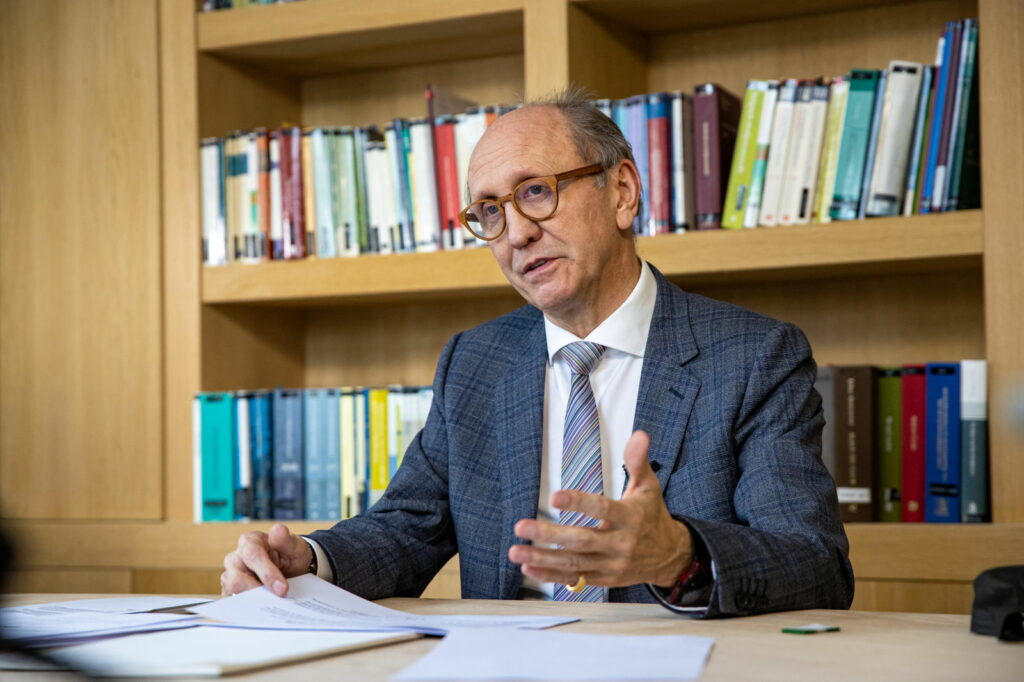Johan Vande Lanotte, one of the lawyers in the case of former teacher Yüksel Yalçınkaya, about whom the Grand Chamber of the European Court of Human Rights (ECtHR) made a landmark ruling on Tuesday, talks about what action Turkey must take in the wake of the ruling. Vande Lanotte, also a former deputy prime minister of Belgium, a reputed professor in international human rights law and a coordinator for the Turkey Tribunal, a symbolic, civil society-led international tribunal, says the Turkish government has to take legal steps to prevent a similar violation of the rights of others who are currently standing trial or already convicted of charges similar to those faced by Yalçınkaya based on noncriminal actions.
Johan Vande Lanotte
The Grand Chamber of the European Court of Human Rights, on September 26, 2023, delivered a groundbreaking judgment in the case of Yalcinkaya v. Türkiye. In its decision, the Grand Chamber found that the applicant, Mr. Yalçınkaya’s conviction violated several important articles of the European Convention on Human Rights (ECHR), including of Article 7 ECHR (no punishment without law), Article 6 § 1 ECHR (right to a fair trial) and Article 11 ECHR (freedom of assembly and association).
Mr. Yalçınkaya’s conviction had been based decisively on the use of ByLock, an encrypted messaging application similar to Signal and Telegram, which the Turkish domestic courts held had been designed for the exclusive use of the “Gülen Movement” – a group designated by Turkish state authorities as the “FETÖ/PDY.”
Between 2015 and 2021 approximatively 270,000 persons had been convicted for their alleged membership of a terrorist organization, namely “FETÖ/PDY,” and criminal investigations and prosecutions still continue in Turkey. Most of these individuals had been convicted based on their alleged use of ByLock as well their membership of unions or other associations disbanded in the post-2016 coup period due to their alleged affiliations to the “Gülen Movement.”
In the Yalcinkaya judgment, the Grand Chamber found that these convictions based on the use of ByLock clearly violate fundamental principles enshrined in the ECHR including Article 6 and 7 ECHR. In particular, the Grand Chamber underlined that the victims of these arbitrary judicial decisions suffered from an almost automatic presumption of guilt, making it nearly impossible for them to contradict the ByLock evidence and exonerate themselves.
More importantly, the Grand Chamber highlighted that “the problems which had led to findings of violations were systemic in nature.” In this regard, the Grand Chamber called on Turkey to take necessary measures to address those systemic problems, notably with regard to the Turkish judiciary’s approach to ByLock evidence.
The Turkey Tribunal has repeatedly underlined that hundreds of thousand of people in Turkey have fallen victim to massive arbitrary convictions and imprisonment. In the Yalcinkaya judgment, the ECtHR’s Grand Chamber, the highest authority concerning human rights in Europe, unequivocally confirmed this finding. Following Tuesday’s judgement, the Turkey Tribunal would like to underline that Turkey has clear obligations under the ECHR to implement the Yalcinkaya judgment and take both individual measures including the reopening of the criminal proceedings to put an end to the violations found in the present case and afford redress to Mr. Yalcinkaya and general measures to address the defects identified in the judgment in order to prevent or redress other similar violations in the future, for instance by creating the possibility for other victims of the same violations to have their rights reinstated.

